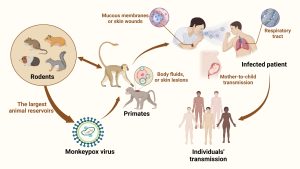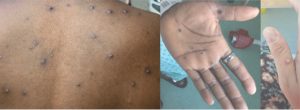Oleh: Thalia Kaylyn Averil
Cases of monkeypox in Indonesia are on the rise again. As of October 30, 2023, there are 27 monkeypox cases in Indonesia, spreading across Bandung, Tangerang, and Jakarta. Currently, all patients are in good condition and not experiencing severe illness, but they are required to isolate themselves in healthcare facilities. Therefore, it is important for the general public to learn more about monkeypox. The disease known as monkeypox is caused by infection with the monkeypox virus which belongs to the genus Orthopoxvirus. Monkeypox was first discovered in 1958 when an outbreak similar to smallpox occurred in a colony of monkeys used for research. The first case of monkeypox in humans was recorded in 1970 in the Democratic Republic of the Congo. Since then, cases of monkeypox have increased and have reportedly spread to several other countries in West Africa and Central Africa.
The monkeypox virus spreads when a person comes into contact with infected animals, infected humans, or materials contaminated with the monkeypox virus. Transmission can also occur from the pregnant mother to the fetus via the placenta. This virus can be transmitted from animals to humans through bites or scratches from infected animals. Currently, the animals that have been confirmed to cause monkeypox are monkeys, pangolins, hedgehogs, squirrels, and mice, while other animals are still being studied. Furthermore, the virus can spread through contact with infected bodily fluids, wounds, or respiratory droplets if there is prolonged close contact. Apart from that, the virus can also be transmitted through items that come into contact with the fluid or wound, such as clothing or linen.

The signs and symptoms of monkeypox resemble chickenpox, with symptoms starting with headache, fever, fatigue, and muscle pain. However, monkeypox and chickenpox can be distinguished from each other because monkeypox results in swelling of the lymph glands,
whereas chickenpox does not. The incubation period of monkeypox ranges from 6–13 days, but it can potentially extend up to 21 days. The duration of the illness is between 2–4 weeks. Signs and symptoms of monkeypox include:
● Headache
● Fever >38.5°C
● Asthenia or fatigue
● Myalgia or muscle pain
● Lymphadenopathy or swollen lymph glands
● Fluid-filled or pus-filled lesions that begin on the face and then spread throughout the
body

Figure 2. Lesions that can occur in patients with monkeypox
Monkeypox virus infection can be prevented by taking the following actions:
● Avoid contact with infected patients and animals, including animals that have died from
monkeypox
● Avoid contact with items that have been in contact with infected patients and animals
● Isolate patients and animals infected with monkeypox in health facilities
● When caring for infected patients and animals, use personal protective equipment and
wash hands well and properly after contact
● Cook meat properly and make sure it is cooked before consuming
Resources
References:
1. CNBC Indonesia. Kemenkes catat 27 kasus cacar monyet, ini sebaran wilayahnya
[Internet]. Jakarta: CNBC Indonesia; 2023 Oct 31 [cited 2023 Oct 31]. Available from:
https://www.cnbcindonesia.com/lifestyle/20231031130641-33-485165/kemenkes-catat-2
7-kasus-cacar-monyet-ini-sebaran-wilayahnya
2. B2P2VRP Kementerian Kesehatan Republik Indonesia. Penyakit cacar monyet
(monkeypox) dan yang perlu kita tahu tentangnya [Internet]. Salatiga: B2P2VRP
Kementerian Kesehatan Republik Indonesia; date of publication unknown [cited 2023
Oct 31]. Available from:
http://www.b2p2vrp.litbang.kemkes.go.id/mobile/berita/baca/419/Penyakit-Cacar-Monye
t-Monkeypox-dan-yang-Perlu-Kita-Tahu-Tentangnya
3. Harris E. What to know about monkeypox. JAMA Network [Internet]. 2022 May 27
[cited 2023 Oct 31];327(23):2278-9. Available from:
https://jamanetwork.com/journals/jama/fullarticle/2793012
4. Center for Disease Control and Prevention. Pox virus [Internet]. Atlanta: Center for
Disease Control and Prevention; date of publication unknown [cited 2023 Oct 31].
Available from: https://www.cdc.gov/poxvirus/monkeypox/index.html
5. Niu L, Liang D, Ling Q, Zhang J, Li Z, Zhang D, et al. Insights into monkeypox
pathophysiology, global prevalence, clinical manifestation and treatments. Frontiers
[Internet]. 2023 [cited 2023 Nov 2];14. Available from:
https://www.frontiersin.org/articles/10.3389/fimmu.2023.1132250/full
